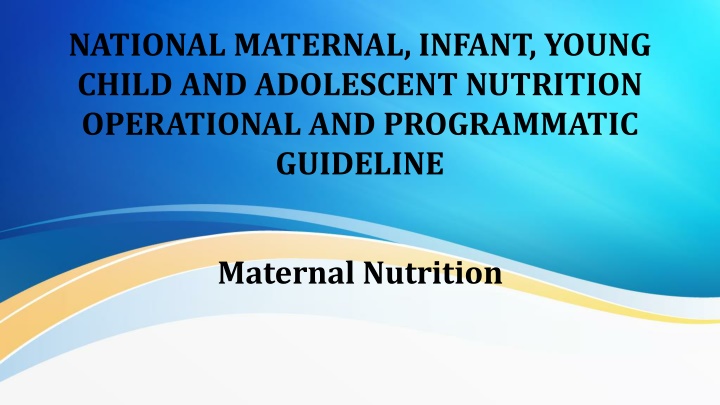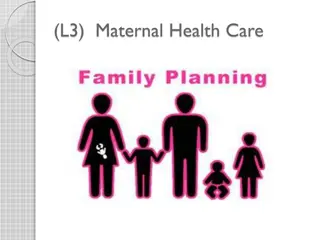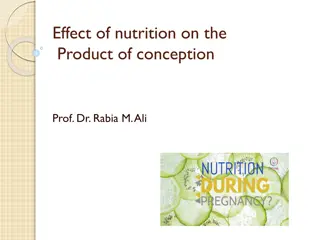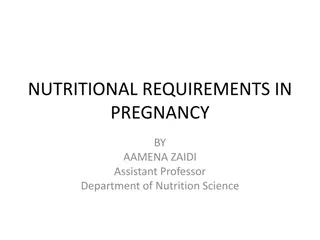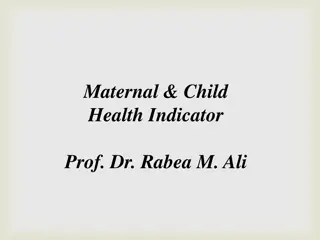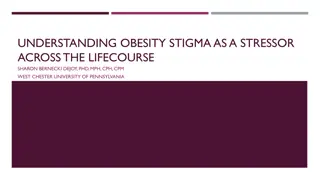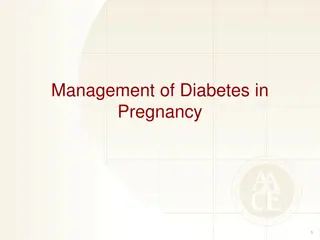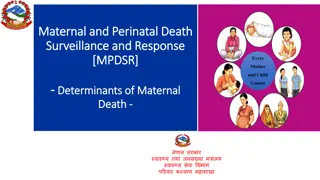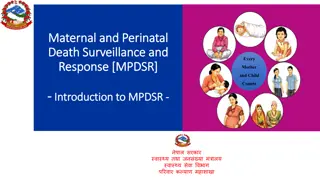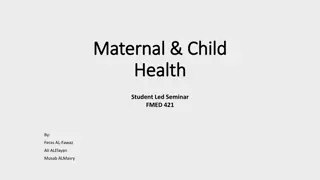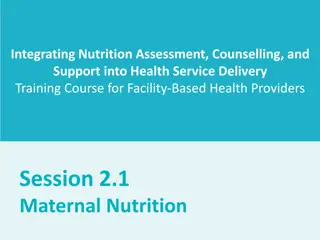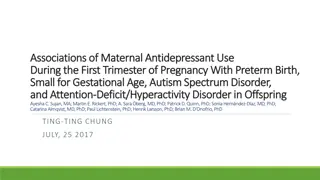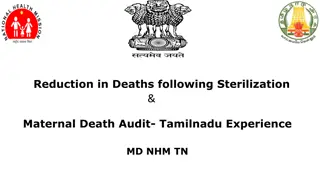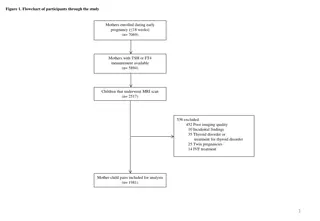Maternal Nutrition Guidelines for Optimal Health Before and During Pregnancy
Recommended maternal nutrition practices play a crucial role in preventing nutrition deficiencies in both mothers and infants, improving fetal outcomes, and reducing morbidity and mortality rates. Preconception care emphasizes the provision of health interventions to women and couples before conception to enhance maternal and child health outcomes. It includes measures such as screening for anemia and diabetes, supplementing with iron and folic acid, monitoring nutritional status, promoting exercise, and iodizing salt. Counseling on pre-pregnancy, pregnancy, and lactation covers areas like dietary intake, healthy eating habits, physical activity, diverse diet choices, and breastfeeding practices. Overall, these guidelines aim to reduce maternal and child mortality, prevent complications, and improve long-term health outcomes.
Download Presentation

Please find below an Image/Link to download the presentation.
The content on the website is provided AS IS for your information and personal use only. It may not be sold, licensed, or shared on other websites without obtaining consent from the author.If you encounter any issues during the download, it is possible that the publisher has removed the file from their server.
You are allowed to download the files provided on this website for personal or commercial use, subject to the condition that they are used lawfully. All files are the property of their respective owners.
The content on the website is provided AS IS for your information and personal use only. It may not be sold, licensed, or shared on other websites without obtaining consent from the author.
E N D
Presentation Transcript
NATIONAL MATERNAL, INFANT, YOUNG CHILD AND ADOLESCENT NUTRITION OPERATIONAL AND PROGRAMMATIC GUIDELINE Maternal Nutrition
Maternal Nutrition Maternal Nutrition Recommended maternal nutrition practices before, during pregnancy & lactation prevents nutrition deficiencies in the mother & infant, improves foetal outcomes, reduces both morbidity & mortality Preconception care The provision of biomedical, behavioral & social health interventions to women & couples before conception It aims to improve maternal & child health, through improving the health status, reduce individual & environmental factors & behaviours that contribute to poor maternal & child health outcomes Seek preconception care at least three months before trying to conceive
Pre conception care Pre conception care influences; Reduction in maternal & child mortality Helps prevent; Unintended pregnancies Complications in pregnancy & delivery Stillbirths Preterm birth Low birth weight Birth defects Neonatal infections Underweight & stunting Vertical transmission of HIV/STIs Lower risk of; some forms of childhood cancers, type 2 diabetes & cardiovascular disease later in life Pre conception care for nutritional conditions focus on; Screening for anaemia & diabetes Supplementing iron & folic acid Information, education & counselling Monitoring nutritional status Supplementing energy & nutrient dense food Management of diabetes & hypertension Promoting exercise Iodization of salt
Counseling Pre-Pregnancy, Pregnancy & Lactation Pre Conception Pregnancy Breastfeeding ANC attendance and HIV Attendance of antenatal care eight times during pregnancy Knowing HIV status, attending all the clinic appointments, & taking medicines as advised Dietary intake Healthy eating & physical activity to stay healthy, attain or maintain a healthy weight and/or prevent excessiveweight gain Increase daily energy & protein intake to increase BMI and/or reduce the risk of LBW infants in undernourished populations Diverse diet, including locally available & affordable nutritious foods & fortified foods (iodized salt, fortified vegetable oil & fortified cereals) Avoid drinking tea or coffee with meals and limit the amount of coffee during pregnancy Adequate rest and reducing heavy workloads Dietary supplementation Continued & consistent use of IFA includinghow to take supplements & manage side effects Continued & consistent use of balanced energy-protein supplements in undernourished populations Breastfeeding Breastfeeding (initiation immediately after delivery, providing colostrum, not giving prelacteal feeds, exclusive breastfeeding, continued breastfeeding, managing breastfeeding problems) Family Planning Knowledge on Lactation Amenorrhoea Method (LAM) and child spacing Hygiene Hand washing at criticaltimes & food hygiene practicesthrough safe handling, preparation & storage
Recommendations in Pregnancy & Lactation Increase dietary requirements to support changes in maternal tissues, metabolism, foetal growth & development Pregnancy Energy requirements increase by an average of 300 kcal/day Increased need for protein, vitamins & minerals such as iron, folic acid & calcium Lactating women Nutrient requirements are highest among lactating women For restoring their body nutrient stores Energy requirements increase by 640 kcal/day
Recommended maternal Preconception care: maximizing the gains for maternal & child health Preconception care package includes; information, education & counselling on nutrition, promotion of exercise, IFA supplementation, & energy- & nutrient- dense food supplementation Recommendations on postnatal care All women should be counselled on nutrition as part of postnatal care IFA supplementation should be provided for at least three months postpartum
Recommendations for a positive pregnancy Counsel on healthy eating & keeping physically active to stay healthy & prevent excessive weight gain A healthy diet during pregnancy; adequate energy, protein, vitamins & minerals, through consumption of a variety of locally available nutritious foods Counselling should be women-centred & delivered in a non-judgmental manner In undernourished populations, nutrition education on increasing daily energy & protein intake to reduce the risk of LBW
Recommendations for a positive pregnancy Balanced energy & protein dietary supplementation to reduce the risk of stillbirths & SGA Daily oral IFA supplementation (30 60 mg of elemental iron & 400 g of folic acid) to prevent maternal anaemia, puerperal sepsis, LBW & preterm birth Intermittent oral IFA supplementation (120 mg of elemental iron & 2800 g of folic acid) once weekly to improve maternal & neonatal outcomes if daily iron is not acceptable & populations with anaemia prevalence among pregnant women of <20 per cent
Weight gain in Pregnancy Gestational weight gain >< recommended increases risk of adverse maternal & infant outcomes e.g. Small-for-gestational-age (SGA) Large-for-gestational age births Preterm births Macrosomia & caesarean delivery May lead to postnatal weight retention
Recommended weight gain in pregnancy Recommended monthly weight Total recommended weight gain Trimester Weight month gain per Nutritional status Pre pregnancy BMI Recommended weight gain 1sttrimester 0.5 kgs per month Underweight < 18.5 kg/m2 12.5 18 kg 2ndtrimester 1 1.5 kgs per month Normal weight 18.5 24.9 kg/m2 11.5 16 kg 3rdtrimester 2 kgs per month Overweight 25 29.9 kg/m2 7 11.5 kg Adapted from Institute of Medicine (US), 1991 Obese > 30 kg/m2 5 9 kg
Screening of Pregnant and lactating Women MUAC used to: To identify underweight Admission criteria for pregnant & lactating women Admission criteria Under nutrition status Identify Pregnant & lactating women at greater risk PLW with MUAC 21cm 18 - Moderate Acute Malnutrition PLW stabilization MUAC 18 - 21cm discharged from with Systematically screen for acute malnutrition centers Low MUAC in pregnant women associated with intrauterine growth restriction, LBW, neonatal morbidity PLW less than 18cm MUAC Severe (OTP/SC management) Acute Malnutrition
Iron and Folic Acid supplementation Supplementation of pregnant women with Iron & Folic Acid (IFA) Part of ante-natal care Treatment of severe anaemia Women with anaemia, treated with daily iron (120 mg of elemental iron) & folic acid (400 g or 0.4 mg) supplementation Daily IFA supplementation in pregnant women Supplement Composition Iron: 30-60mg of elemental iron Folic Acid: 400 g (0.4mg) Target Group All pregnant adolescents & women Frequency One supplement Daily Duration Throughout pregnancy, starting as early as possible
Deworming and malaria control in pregnancy Malaria Control For malaria-endemic areas Part of antenatal care Long lasting insecticide treated net Provide intermittent preventive treatment with SP to all women Provided in first or second pregnancy (SP-IPTp) Dosing starts in second trimester Given at least one month apart Ensure at least three doses are received Higher folic acid dose (5 mg daily) significantly reduces efficacy Low dose folic acid (0.4 mg daily) do not reduce the efficacy of SP Deworming Administration To control intestinal parasites Provided to pregnant women Provided after first trimester of pregnancy Use single-dose albendazole (400 mg) or mebendazole (500 mg)
